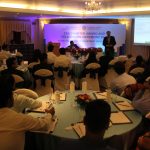- July 30, 2016
- Posted by: kunalsabnis
- Category:BLOG, Events, New Delhi, Panel Discussion, Speaker Events
Contributed by: Ojasvi Khicha, CFA
The Delhi chapter of the Indian Association of Investment Professionals, (IAIP) organised a session on ‘Adoption of New Indian Accounting Standard: Potential Impact on Corporate Earnings’ by Sai Venkateshwaran, Partner and Head – Accounting Advisory Services, KPMG India, at Hotel Lemon Tree in New Delhi on 9 July 2016. It was followed by a panel discussion on ‘Practical Insights on Implementation of Ind-AS’. The panellists were Sai Venkateshwaran; Gaurav Vohra, Partner – Accounting Advisory Services, KPMG; and Arvind Mathur, CFA, President – IVCA. Aviral Jain, CFA introduced the speaker to the audience. Sai has over 20 years of industry experience and is a member of the CII Committee on Financial Reporting.
Sai began his session with the context that India has followed the Indian Generally Acceptable Accounting Principle (IGAAP). However, from FY17, it will follow Ind-AS whose principles are closely based on the international accounting system called IFRS. This will increase comparability of Indian companies with their international counterparts.
For general corporates, the financial year starts from 2016-17, whereas for other corporates, banks and insurance firms, and other NBFCs by 2018-19. Sai stated that delayed compliance requirement for banks and financial institutions is primarily due to the additional time needed to finalise rules for classification and measurement for financial instruments and change in model to recognise provisions for loan losses in P&L.
Sai emphasised that the new accounting standards recognise substance over form and importance of fair value to compute financial statements. This means accurate reporting will gain importance over just complying with legal provisions and it should reflect the most current picture of financials. It will impact how key financials such as revenue, operating profit, net profit, book value, goodwill and return on equity will be computed. For instance, redeemable preference shares which were recognised as part of shareholder’s equity will now be classified as debt under new accounting standards. This would have material impact on key ratios like debt to equity, interest coverage ratio, etc.
Under phase I of the IFRS transition, all listed companies with assets of INR 500 crore will be required to comply with the new provisions. In order to do this, corporates will also have to show their previous year’s accounts restated as per IFRS. The new rules would ensure more disclosures and volume of information. Sai narrated an interesting anecdote: When IFRS was introduced in the UK in 2005, Britain’s Royal Mail refused to deliver companies’ annual reports as they had become bulkier –some reports running into 300 pages!
Among the key transactions that will be affected are the acquisition consolidation rule, which would change from hitherto greater than 50% stake method to effective control rule. Goodwill reporting will decline and be replaced by line items such as technology intangibles, brand value, customer relationship, etc. Even private equity transactions that have some form of promised payments will be treated as obligations, hence, these transactions will change various ratios of corporates. Subsidiaries may not be consolidated anymore if there is joint control along with private equity. Similarly, embedded lease will be recognised in the balance sheet. For example, FMCG companies often enter into contract manufacturing and receive products and promise payments for quite a long time in the future. Under new rules, they would have to recognise such contracts as embedded lease. Other sectors which will be affected include power, infrastructure, pharma, auto, and IT & BPO. The new principle would also lead to more transactions flushed through P&L rather than capitalising. For instance, pre-operating expense where corporates hitherto had a lot leeway in capitalising along with core assets will now need to be charged to P&L. Similarly, foreign currency fluctuations need to be flushed through P&L. Build Operate Transfer (BOT) assets will now be an intangible asset (from earlier reporting classification as fixed assets) as it reflects right to collect payments. For example, GMR running Delhi airport which is owned by AAI. So, GMR won’t be able to recognise it as a fixed asset in their books.
Companies have started implementing changes and engaging with investors and analysts. Some companies are already putting numbers in public domain, viz. Marico Industries and Hindustan Unilever Ltd. Sai showcased change in some key financial metrics for these companies due to change in accounting standards.
Sai answered lot of questions from the curious audience before he joined panel members for discussion on practical insights on implementation of Ind-AS. Panel members shared their experience in dealing with clients on transition to new accounting standards. Sai revealed that some promoters are proactive and welcome these new standards whereas few promoters who are shy and fearful of new information which needs to be disclosed. Gaurav shared interesting insights and advised to keep a tab on two things specifically – barter transactions reporting for media companies and secondly, segment reporting by corporates which would now undergo significant change as it would be reviewed by Chief Operating Decision Maker (CODM). Gaurav further stated that there are several cases where corporates need to renegotiate contracts in the light of upcoming accounting standards.
The programme ended with a vote of thanks from Aviral Jain, CFA.
-OK


















